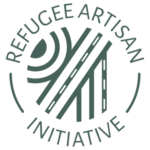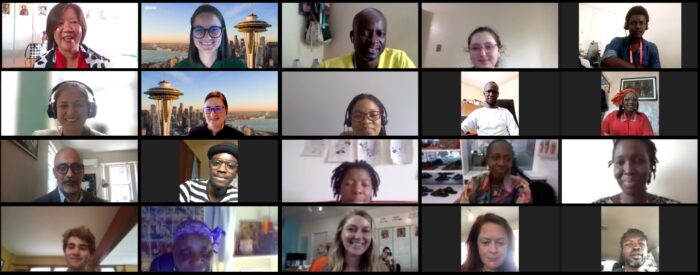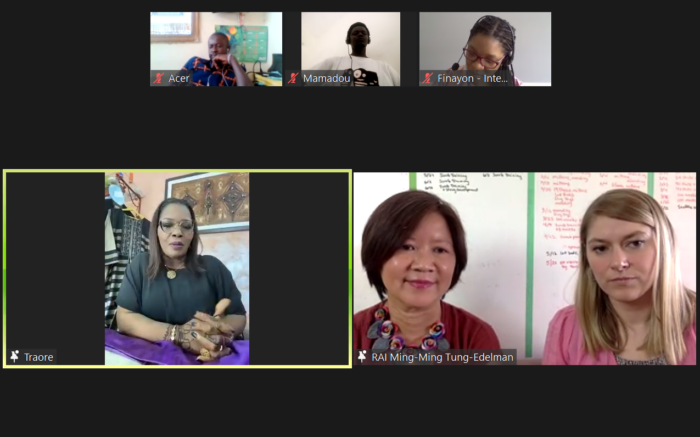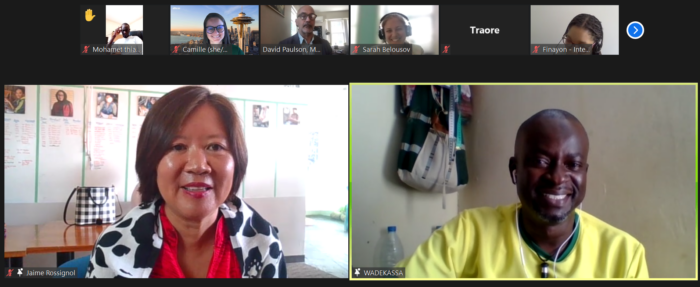Community Spotlight Series: Refugee Artisan Initiative
November 19th, 2021
Founder of Refugee Artisan Initiative, Ming-Ming Tung Edelman, gives a virtual tour of the RAI workspace and the textiles the artisans use.
Refugee Artisan Initiative (RAI) is a Seattle-based non-profit organization that partners with immigrant and refugee women to foster an inclusive, prosperous transition to the United States through artisan training and employment in small batch manufacturing. Since 2017, RAI has trained and supported 23 refugee and immigrant Artisans who left Ethiopia, Myanmar, Morocco, Vietnam, Afghanistan, and China, to name a few, to start a new life in Washington after escaping discrimination, hardship, and turmoil in their home countries. RAI Artisans are typically mothers, between the ages of 30 and 55 years old, with young children and limited English-speaking ability who earn their first paycheck in the United States through the support of RAI. RAI provides skills training, employment, and entrepreneurial support. RAI helps Artisans to obtain a business license and become a microbusiness, subsidizing their earnings so that they earn a living wage while contributing to the local economy.
is a Seattle-based non-profit organization that partners with immigrant and refugee women to foster an inclusive, prosperous transition to the United States through artisan training and employment in small batch manufacturing. Since 2017, RAI has trained and supported 23 refugee and immigrant Artisans who left Ethiopia, Myanmar, Morocco, Vietnam, Afghanistan, and China, to name a few, to start a new life in Washington after escaping discrimination, hardship, and turmoil in their home countries. RAI Artisans are typically mothers, between the ages of 30 and 55 years old, with young children and limited English-speaking ability who earn their first paycheck in the United States through the support of RAI. RAI provides skills training, employment, and entrepreneurial support. RAI helps Artisans to obtain a business license and become a microbusiness, subsidizing their earnings so that they earn a living wage while contributing to the local economy.
All RAI products are made from clean, upcycled textiles, diverting over 5,000 pounds of waste from landfills each year. RAI Artisans manage individual product lines, and help with two major RAI product lines: medical scrubs for front-line workers and zero-waste pet products, such as dog beds and chew toys.
RAI was founded in 2017 by Ming-Ming Tung Edelman, who was herself an immigrant from Taiwan. Drawing on her own experience, she built RAI to educate, employ, and transform the lives of refugee and immigrant women by providing sustainable work.

Founder Ming-Ming Tung Edelman (top left) speaks during the RAI-Senegal Artisan Showcase in June 2021.
The World Affairs Council and RAI first connected during a virtual November 2020 International Visitor Leadership Program (IVLP) for Senegal, titled “Strengthening Economic and Commercial Ties: Fashion Ecosystems,” that explored the development of the U.S. fashion industry and its international commercial ties. The IVLP is the U.S. Department of State’s premier professional exchange program. Established more than 80 years ago, IVLP participants are nominated by U.S. Embassies from around the world and represent emerging leaders in their respective fields. During this particular IVLP meeting in November, RAI and the Senegalese IVLP participants immediately connected, and RAI saw an opportunity to stay in touch to further share best practices between their work and what the Senegalese artisans and fashion entrepreneurs were doing. With the support of the U.S. Embassy Dakar, RAI created a two-part virtual workshop series in June of 2021 that allowed them to showcase the extent of their work - covering everything from board governance to their circular supply chain to their incredible makerspace located in Seattle. These sessions also allowed for a bilateral artisan showcase, where RAI artisans demonstrated design and sewing techniques, and the Senegalese artisans shared their unique designs and materials. Throughout both virtual sessions, the conversations between RAI staff and the Senegalese IVLP participants demonstrated a commitment and enthusiasm for fostering artisan and fashion ecosystems that both harnessed the creativity and diversity of the designers and provided an engine to economic empowerment.
Wearing a dress designed by Brittany Forney, RAI’s Sewing Coordinator, and a necklace designed and crafted by RAI artisans, Ming-Ming eagerly expressed her interest in collaborating with the Senegalese artisans after hearing their opinions on fashion and viewing their designs. She elaborated that RAI began with women “from around the world with different designs” and that collaboration would not only improve the morale of both parties but also “open up friendships” and an “open-mindedness” about the world and the cultures and fashion that people interact with daily. Awa Traore, founder and CEO of Banama Style based in Dakar, enthusiastically supported the idea of collaboration, acknowledging that it is important to “discover the outside world” and to “merge the [various design] ideas of what [they] do and what others do." In the exchange of skills with artisans from around the world, RAI hopes to showcase their belief that “fundamentally, human nature has a creative and collaborative spirit, when in the right environment,” and when given the opportunity, people can flourish.

Awa Traore, founder and CEO of Banama Style (left) discusses collaboration with Ming-Ming Tung Edelman and Brittany Forney of RAI (right).
RAI earnestly supports both a thriving local and global community and it recognizes the value of opportunities that allow people from around the world to learn from one another, especially through the creative and unique lens of artisans. By emphasizing home-based production, RAI helps artisans from across Seattle maintain their autonomy while simultaneously providing for their families. For instance, during the COVID-19 pandemic, RAI offered a six-week training course on making scrubs for local medical institutions, where skills such as top-stitching and hemming would become transferable to other sewing ventures, all in support of the autonomy and self-sufficiency of the artisans. Brittany provided the story of one of their artisans, Diba, a refugee from Afghanistan, who after a year of working with RAI, saved enough money to purchase her husband a car so he could become an Uber driver, as Diba herself doesn’t drive. By helping refugee artisans create their own economic foundation, they are then able to extend those economic benefits outwards. Senegalese artisan Abdoul Aziz Cissé, the owner of Ndouxou, echoed the efforts of RAI during one of the June IVLP sessions by discussing his own work in trying to teach local artisans to further their craft while also fueling the economy.

Ming-Ming Tung Edelman (left) speaks with Founder of Wadekassa Coutur, Mouhamadou Lamine Wade (right) during the RAI-Senegal Artisan Showcase in June 2021.
While working to engage the community and help its refugee artisans gain economic independence, RAI’s work is also built on sustainability. Ming-Ming and Jaime Rossignol, RAI’s Program & Operations Manager, shared RAI’s goal of diverting 5000 lbs of textile waste by incorporating it into their artisans’ work. With materials that are entirely upcycled and donated, artisans create numerous products: dog toys, candles made from baby food jars, various home goods, and scrubs. RAI’s many community partnerships are also linked to its focus on sustainability. For instance, the COVID-19 pandemic created a demand for masks, and RAI’s artisans have answered this call by making masks with donated material from Amazon. Currently, as the need for masks has lessened but the material from Amazon remains, RAI has partnered with the Seattle Farmers Market Association (SFMA) to sell reusable grocery bags at local farmer’s markets. In line with RAI’s efforts to continually give back to their local community, they will be donating 20% of the proceeds from the grocery bags to SFMA’s The Good Farmer Fund to support Washington’s agricultural workers with financial security. Additionally, RAI is partnering with four agencies serving homeless and low-income students. RAI Artisans are sewing cheery “back-to-school bundles” that include a pencil case, reusable snack and sandwich bag, and a mask to distribute to 500 students in need. RAI also hopes to extend its sustainability efforts to glassware, whereby consumers can return their used candles for refills to avoid glass waste.
An initiative built by women and flourishing due to the drive of women, RAI helps nurture innovation in refugees from around the globe. Refuting the title that RAI is empowering women, Ming-Ming says that “it’s really a partnership...we nurture their innovation.” Inspired by her grandmother, whose handmade dress hangs in RAI’s window, Ming-Ming has seen how women can transform their lives and the lives of those around them when provided the opportunity and the tools to turn skill and drive into career opportunities. RAI is a thriving example of putting that knowledge into action. Thank you, Refugee Artisan Initiative, for engaging globally, inspiring artisans and designers in Senegal, and contributing to a thriving local economy and community.
For more information about the Refugee Artisans Initiative and the work they are doing in the local community, please see the links below.
- Learn more about RAI’s story
- Learn how you can become involved with and support RAI
- Shop RAI’s artisan marketplace
New to the Community Spotlight Series? Check out our previous Community Spotlights recognizing our amazing community partners and the lasting impact of exchanges!
By Adeline Perkins, Global Leadership Exchange Intern, recent International Studies graduate from the University of Washington and incoming candidate for a Master of Arts in German and European Studies at Georgetown University’s Walsh School of Foreign Service.
The International Visitor Leadership Program (IVLP) is sponsored by the U.S. Department of State with funding provided by the U.S. Government and administered by members of Global Ties U.S.